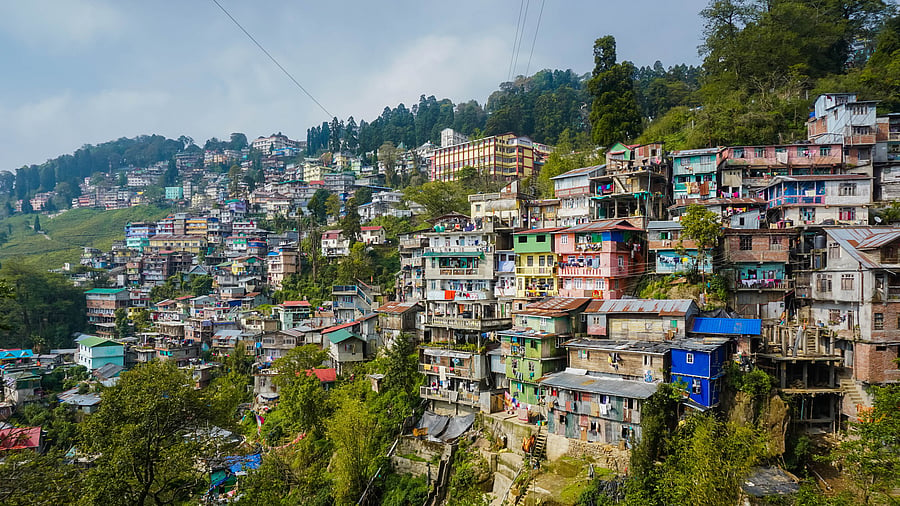
A representative photo of Darjeeling.
Istock Photo
The addition of a sub-regional dimension to the very natural tension inevitable in the asymmetric relationship between the Centre and a State is complicated. The unilateral appointment of an interlocutor to open talks ‘on issues’ relating to Darjeeling, Dooars, and the Terai region of West Bengal, without consulting the Mamata Banerjee government, has provoked a predictably sharp and negative response.
‘Issues’ between the political parties and organisations in the hill areas of Darjeeling, Kurseong, Mirik, and the district of Kalimpong, as well as parts of Siliguri sub-division, which includes the Dooars and the Terai, are necessarily not bilateral. The unresolved ‘issues’, ranging from over a century-old demand for a separate State to the geographical area of the autonomous administrative unit currently called Gorkhaland Territorial Administration, inclusion of the area and the Gorkha people who speak Nepali in the Sixth Schedule to carving out a Union Territory, are not bilateral; the West Bengal government representing the State, is very much a party to the ‘issues’, and any talks to resolve them.
By describing the variations on the demand for a Gorkha homeland as ‘issues’, without listing how the Centre, specifically the Home Ministry, views them, the interlocutor’s role and terms of reference are vague. The vagueness could be deliberate to give the interlocutor an open hand to negotiate with the many political parties and organisations that represent the aspirations of the Gorkha population, minus the smaller segments of Lepcha, Bhutia and other tribal communities, as well as Bengalis, who live within the Darjeeling hills, Dooars, and the Terai. It could also be gaslighting to escalate political tensions between the Bharatiya Janata Party (BJP)-led minority government at the Centre and the Trinamool Congress-led State government.
The political fight for the West Bengal Assembly polls has already been launched, with a continuous barrage of verbal attacks between Banerjee and Prime Minister Narendra Modi as well as Home Minister Amit Shah. Heavy duty munitions have been lobbed on both sides; from Shah’s recent statement that Banerjee is nervous about the detection of “illegal infiltrators” posing as citizens, describing her resistance to the unrolling of the Special Intensive Revision (SIR) of electoral rolls as both against the law and the Constitution, to Banerjee’s push back beseeching the Election Commission of India to not become “a lollipop of the BJP”.
The Centre appointing an interlocutor without consulting the State government is a breach of the basic structure of federalism, where power and responsibility, money and governance, security and policing, are shared between the Centre and the States. The Centre seems to have trespassed on West Bengal’s territory by opening discussions with political parties and organisations, primarily functioning out of Darjeeling, which is a part of the State.
The idea of ‘Gorkhaland’ is peculiarly emotive, and consequently politically hyper-sensitive, because, as the original leader of the Gorkhaland movement Subas Ghisingh, in 1986, said that it is about ‘identity’. For West Bengal and the people living in the plains and foothills, partitioning the State is equally emotive. In the 1980s, the Jyoti Basu government struggled to find a solution to the militant and very violent demand for a separate Gorkhaland state that combined the aspirations of the Gorkha National Liberation Front (GNLF) and the people of West Bengal.
Since 1988, when the tripartite accord between the Centre, West Bengal, and the GNLF was signed, and the Darjeeling Gorkhaland Hill Council (DGHC) was established, there have been simmering tensions, sometimes flaring up into a wildfire with bandhs that lasted as long as two months over elections, money, powers, and status. The ‘issue’ that has led to the conflict is the status of the area controlled by the Gorkhaland Territorial Administration, which succeeded the original DGHC.
In 2013 and 2017, tensions spiralled, there were clashes with the Gorkha Janamukti Morcha, and there were tripartite negotiations. Over time, the number of political organisations representing the interests of the population within the GTA has increased because of fractures and tensions over what ought to be a final solution to the ‘issues’ of identity and homeland for the Gorkha people residing in India.
Ghisingh had argued that the Gorkha people living in India were not Nepali migrants or labour brought in from Nepal by the colonial government; they were residents of the land where Darjeeling and the tea gardens were established. And that all people of Gorkha and Nepali lineage living in India ought to have a homeland.
The pre-election appointment of an interlocutor with an unclear brief and no instructions on consulting with the State government is a live bomb that the Centre has lobbed into a historically volatile space.
The rejection of the appointment of an interlocutor will be one more issue in the tense contest between the BJP, which won 30 seats out of the 54 seats in North Bengal, and the Trinamool Congress that will play out against the massive impact of the rains, landslides, mudslides, and flooding that devastated the area weeks ago. The BJP’s attack on Banerjee’s failure to provide safety to its MLA Khagen Murmu was led by Modi, indicating the kind of political stakes involved in the forthcoming battle for West Bengal.
Shikha Mukerjee is a Kolkata-based senior journalist.
(Disclaimer: The views expressed above are the author's own. They do not necessarily reflect the views of DH.)